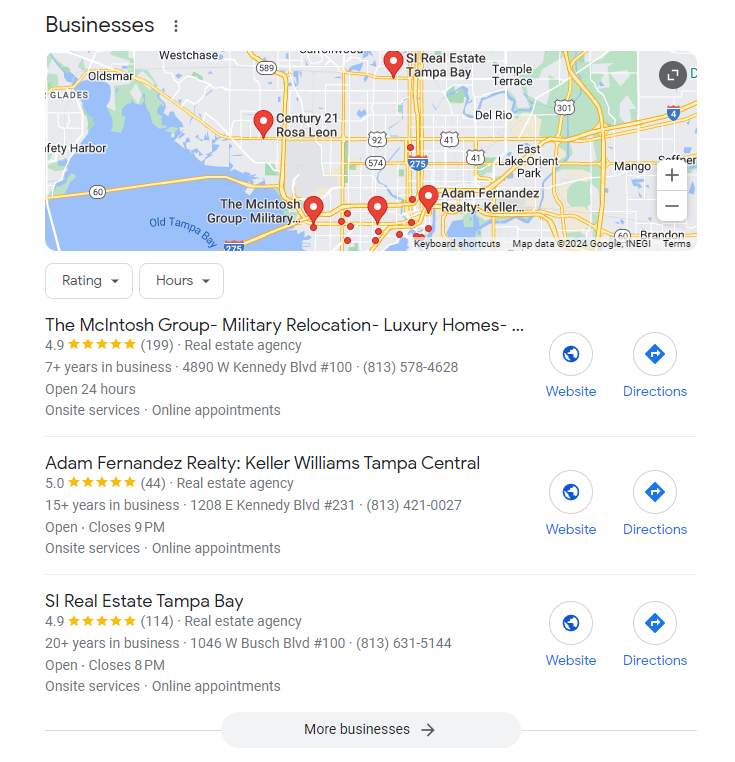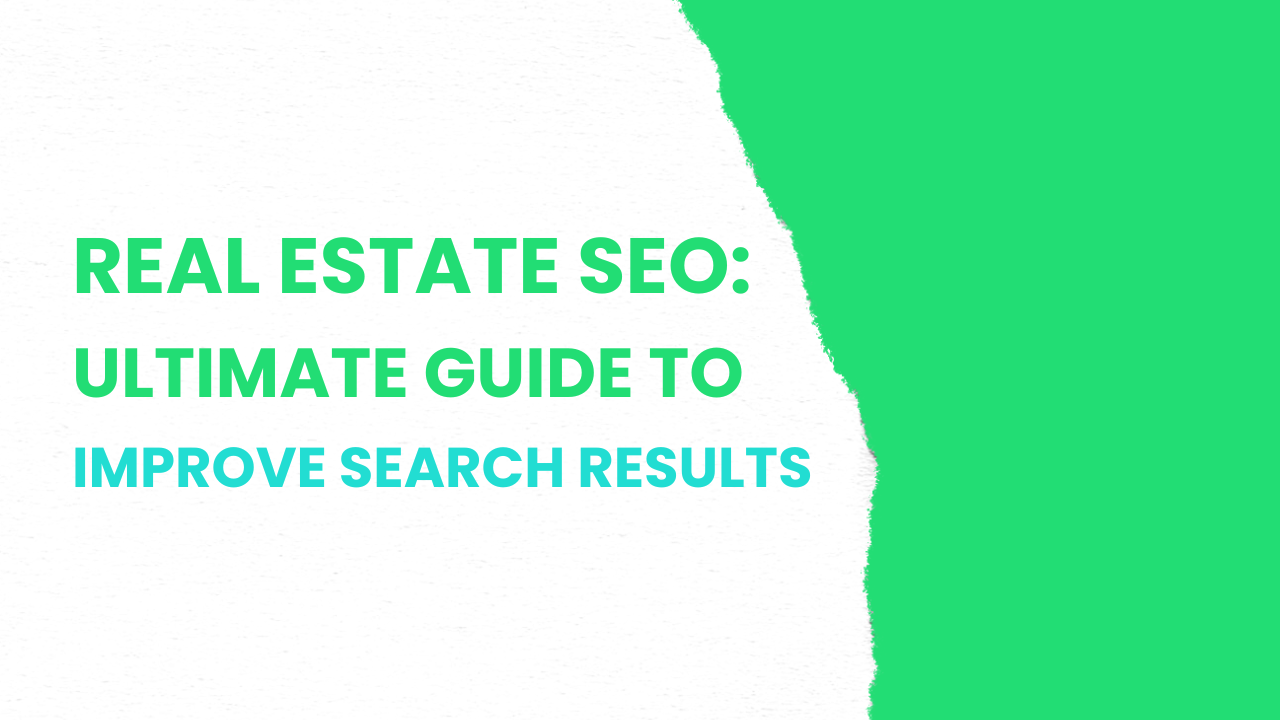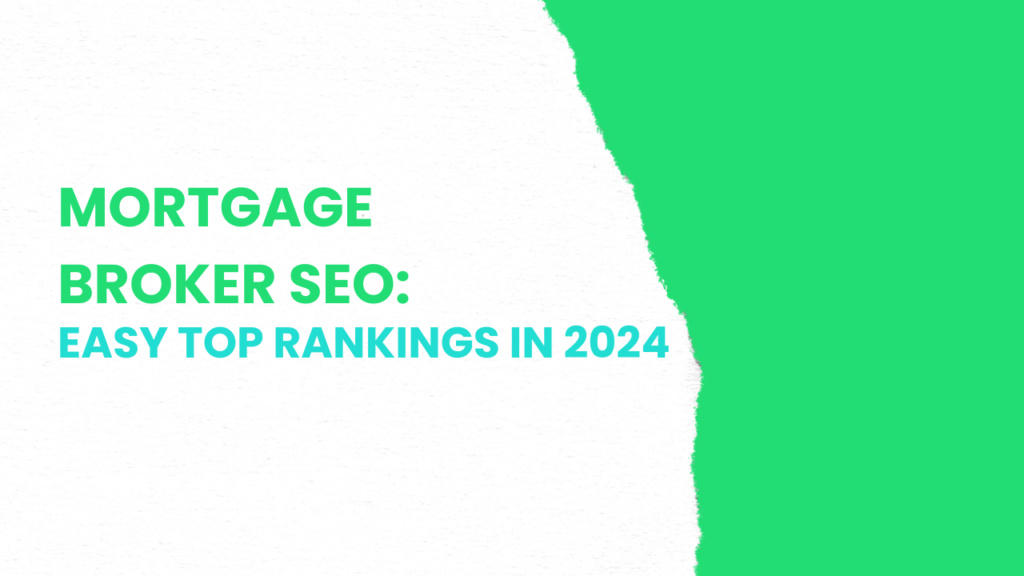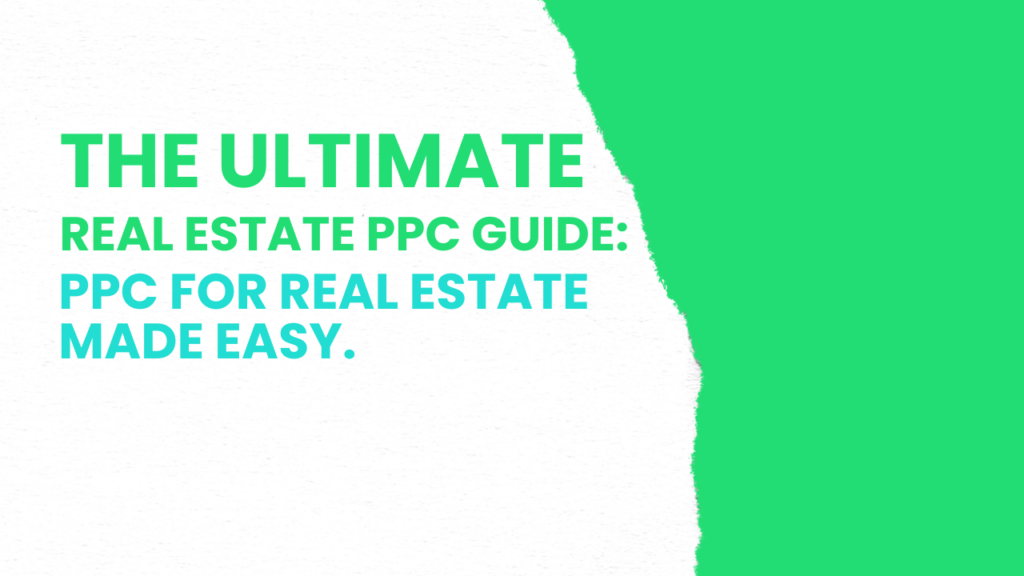Whether you’re a hometown hero or a nationwide agency, a sharp SEO strategy is your key to being at the top of search engine charts, pulling in more house hunters, and sealing more property deals. Dive deep with us into the core of real estate SEO. We’ll cover everything from keyword research basics and on-page SEO tricks to the finer points of local SEO and the nuts and bolts of technical SEO.
We’ll unpack top-drawer SEO tactics and tips that can morph your website into a lead magnet. Plus, we’ll dive into analytics, teaching you to track your SEO wins and tweak your game plan for the win. So, if you’re keen on polishing your property listings, climbing the SEO ladder, or getting the scoop on real estate SEO in 2024, you’ve hit the jackpot. Let’s kick things off and make sure your real estate venture doesn’t just survive but outright flourishes in the digital era.
What is Real Estate SEO?
Real Estate SEO tailors the art of boosting website visibility to the unique vibes of the property market. It’s more than just sprinkling real estate jargon across your web pages. This craft hones in on your site’s structure amps content quality and forges a solid digital footprint. The endgame? To make your site the go-to hub for property seekers in your zone, ensure your offerings pop up first when they’re on the hunt.
Here’s the lowdown on what makes Real Estate SEO special. First off, it’s all about location, location, location. Local searches dominate the property hunt, making local SEO your ace in the hole. Plus, this field is a visual feast. Crisp images and snazzy videos of your properties aren’t just fancy extras; they’re must-haves that need fine-tuning for search engines to notice.
Let’s break it down:
4 Types of Real Estate Search Engine Optimization
- Local SEO: Tune your site to resonate with regional searches.
- National SEO: Casts a broader net for those without a local leash, ideal for bigwig realty firms.
- Technical SEO: Gets under the hood of your website, ensuring it’s a breeze for search engines to navigate and understand.
- Content SEO: Crafts and polishes content that hits the mark, directly addressing your clientele’s burning questions.
By cracking these elements, agents and brokers can craft an SEO strategy that’s not just on point but sniper-accurate, giving their listings and services the limelight they deserve.
Get Your FREE eBook +
Traffic Projection Analysis
+ Website Quality Audit!
The Benefits of Real Estate SEO for Your Real Estate Website
Leaping into Real Estate SEO isn’t just keeping up with the times; it’s a game-changer for your business, with perks beyond just showing up.
- Traffic and Revenue Uptick: SEO funnels not just any crowd but the right crowd to your doorstep. These folks are on the prowl for what you’re offering. More eyes on your site means more inquiries, more tours, and a fatter bottom line.
- Brand Awareness Boost: A top spot in search results does more than just catch eyes; it cements your rep as a heavyweight in the real estate ring.
- Guarding Your Brand’s Image: A savvy SEO strategy isn’t just about shining in the spotlight; it’s about curating what the world sees, ensuring your brand’s online rep is spotless.
In real estate, SEO isn’t just a race to the top of search results; it’s about crafting a digital persona that resonates, attracts, and retains your audience. The outcome? A brand in the real estate industry that’s not just seen but sought after, standing tall in the bustling digital marketing marketplace. Next, we’ll dive into how Real Estate SEO morphs your digital presence into a relentless lead magnet, turning every click and scroll into a potential business opportunity.
Real Estate SEO as a Lead Generation Engine
In today’s digital landscape, your website isn’t just a billboard; it’s your prime tool for snagging clients. Real estate SEO fine-tunes this tool, morphing your online footprint into a mighty engine for generating leads. But this isn’t about herding random traffic to your site. It’s about luring the right crowd—prospective clients primed to dive into your real estate services.
Here’s how SEO stokes the lead generation fire:
- Laser-Targeted Visibility: SEO isn’t about casting a wide net. It’s about precision—ensuring your site pops up for search terms that resonate with your potential clients. When folks are on the hunt to buy, sell, or lease digs, your site’s there, beckoning them in. That means more people using Google search and wanting to connect with what you’re offering.
- Content that Strikes a Chord: Packing your site with SEO-savvy, top-notch content does more than just fill space. It taps into the exact wants and queries of your audience. This magnetic content doesn’t just draw visitors; it hooks them, nudges them to stick around, and paves the way for them to tap your services.
- Mastering the Local Scene: Local knowledge is king in the real estate hustle. Local SEO ensures your site shines bright in regional searches, roping in home buyers and sellers right in your backyard.
By zeroing in on these strategies, real estate SEO ensures your online presence isn’t just noticeable but profoundly resonant and compelling to your target market. The payoff? A consistent stream of quality leads—people genuinely jazzed about what you’re putting on the table.
17 Essential SEO Tips for Your Real Estate Website
Are you embarking on a real estate SEO journey? Roll up your sleeves for a 17-step deep dive that’ll turbocharge your website’s performance. Here’s your comprehensive roadmap:
A. Technical and On-Page SEO
- Spy on the Competition: Suss out your digital rivals. Pinpoint their strengths and weaknesses to sharpen your SEO strategies.
- Audit Your Site: Run a full diagnostic. Root out technical glitches that might be mucking up your site’s search engine cred.
- Tackle Crawling & Indexing Issues: Make sure search engines can snoop around and catalog your site without a hitch.
- Mobile-Optimize: Given everyone’s glued to their phones, ensuring your site is a breeze to use on mobile is necessary.
- Boost Your EAT Factors: Amp up your site’s Expertise, Authority, and Trustworthiness. Stellar content and nods from reputable sites are your tickets.
- ADA Compliance is Key: Your site should be a no-hassle zone for everyone, disabilities notwithstanding.
B. Find Your Real Estate Keywords
- Research Keywords: Dig into the real estate listings and phrases your prospects use to sniff out properties or snag real estate services.
- Snag Long-Tail Keyword Opportunities in Google search: Aim for niche, less crowded search queries that scream relevance to your offerings.
- Weave Keywords into Your Site: Sprinkle your researched keywords thoughtfully across your content, meta descriptions, and title tags.
C. Content and User Experience
- Craft Top-Notch Content: Serve up content that’s not just informative but strikes a chord with your audience.
- Smooth Internal Search: Ensure folks find what they need on your site in seconds.
- Test & Tweak for Better Conversion Rates: Keep tabs on `how your site’s doing and tweak things for a top-tier user experience and conversion rates.

D. Local SEO Optimization and Authority
- Think Local: Hone in on local search terms and listings to mesh with clients in your area.
- Schema Markup for Real Estate Agents: Make it a cinch for search engines to get the gist of your content and jazz up your visibility in search results.
- Nab Local Backlinks: Bag backlinks from local hotspots to jack up your site’s authority and relevance in local search scenes.
- Monitor Your Keyword Rankings: Monitor your keyword performance and switch up your strategy as needed.
- Set KPIs for Your SEO Efforts: Pin down clear, trackable goals to monitor your SEO strides and ROI.
By ticking these boxes, you’re boosting visibility and ensuring your site resonates, engages, and converts. Stay tuned. Next, we’re diving into advanced real estate SEO strategies to improve your website’s performance and online mojo.
Advanced Real Estate SEO Strategy for Real Estate Agents
Diving into the competitive real estate market, you’ll need more than just the basics. Advanced SEO tactics can give your website the edge, ensuring top rankings and a deep connection with your target market.
A. Tailored SEO for Various Real Estate Services
Different market segments, be it residential sales, rentals, or commercial properties, demand unique SEO approaches. Customize your SEO tactics to fit your specific services, ensuring your messages reach the intended audience. For example, while a commercial real estate website may focus on industry-specific jargon, a residential site might be more about local neighborhood charm.
B. Off-Page SEO: Crafting Strategic Backlink Portfolios
Backlinks are gold in SEO, but the quality and relevance genuinely count. Forge alliances with local enterprises, real estate directories, and sector-specific blogs for backlinks that lift your site’s authority and reel in the right crowd.

C. Competitor Analysis: Your Secret Weapon
Knowing your competitors inside out can significantly refine your SEO strategies. Regularly dissect their websites, keyword choices, and content strategies. Tools like SEMrush or Ahrefs can shine a light on their tactics, helping you discover your unique niche.
D. Prioritizing User Experience
Google loves sites that pamper their users. So, ensure yours is swift, mobile-responsive, and easy to navigate. Content that genuinely resolves your audience’s queries can reduce bounce rates and entice visitors to delve deeper.
E. The Art of Continuous Optimization
SEO is a constant game of evolution. Stay on your toes by routinely monitoring your site’s performance, experimenting with novel SEO strategies, and staying attuned to market shifts and search engine updates. By weaving these advanced strategies into your framework, you’re amplifying your real estate website’s ranking and enriching your visitors’ experience, nurturing trust, and cementing your brand’s authority.
In the upcoming section, we’ll unpack how to fine-tune your content for real estate SEO, ensuring your website secures top rankings and captivates and converts your audience.
Fine-Tuning Content Best Practices
In the SEO universe, content reigns supreme, especially in real estate. SEO-driven, quality content can allure, engage, and transform your audience, morphing your real estate website into a dynamic lead-generation engine.
A. Crafting and Refining Content
- Know Your Audience: Understand their desires, concerns, and questions. Tailoring your content to your audience ensures relevance and engagement.
- Smart Keyword Integration: Embed your researched keywords organically into your content. They should enrich and contextualize your content, not just serve as SEO fodder.
- Deliver Comprehensive, Useful Content: Your articles should be a treasure trove of insights, whether market trend analyses, buyer guides, or detailed property showcases.
- Embrace Diverse Content Formats: Mix it with videos, infographics, and interactive tools. Visually striking content like high-quality property photos and virtual tours can be incredibly engaging in real estate.
B. The Power of Visual Content
- Optimize Images and Videos: Compress for speed, name files descriptively, and don’t forget the alt text with keywords. Host videos on platforms like YouTube to tap into their SEO prowess and embed them thoughtfully on your site.
- Virtual Tours and Interactive Features: These provide an immersive experience and keep visitors glued to your site longer—a big thumbs up from search engines.
- Leverage User-Generated Content: Reviews, testimonials, and user interactions add authenticity and can be a goldmine of organic keywords and fresh content.
Creating and optimizing your content for SEO is not just about climbing the search engine ladder; it’s about crafting a rich, engaging user journey. The right content can elevate your real estate website, transforming casual visitors into leads and loyal clients. Next, we’ll delve into the technical bedrock of real estate SEO, ensuring your website’s infrastructure is sturdy, seamless, and search-engine-friendly.
The Technical Backbone of Real Estate SEO
Navigating through the technical maze of real estate SEO is more than just a savvy move; it’s necessary. This technological prowess isn’t just about getting noticed by search engines. It’s about crafting a seamless, user-friendly digital space, laying a rock-solid groundwork for your content and backlink ventures.
A. The Art of Technical SEO Audits
- Speed is Key: Nobody’s got time for a snail-paced site. Slow load times can sour user experience and spike bounce rates. Dial into tools like Google’s PageSpeed Insights to spot speed bumps and how to fix them.
- Mobile is Massive: With more folks browsing on the go, a mobile-responsive site isn’t just excellent; it’s a must. Use Google’s Mobile-Friendly Test to see how your site stacks on smaller screens.
- Open Door for Crawlers: Make sure search engines can easily waltz through and index your site. The robots.txt file is your bouncer, guiding these crawlers, while an XML sitemap is your open invitation to Google to recognize all your key pages.
- Secure and Welcoming: Roll out a secure, inclusive red carpet for your users. HTTPS isn’t just about security; it’s about trust. And ensuring your site is accessible to everyone, including those with disabilities, is not just good karma; it’s good business.
B. The Mobile Optimization Mandate
- Smooth Sailing on Mobile in the real estate industry: A mobile-optimized site should be a joy to navigate, with swift-loading images and content that’s a cinch to read. Stellar mobile user experience keeps visitors engaged and on your site longer.
- Local SEO Leverage: For real estate, local is everything. A mobile-optimized site is more likely to shine in regional searches, especially as folks scout for properties on the move.
- Voice Search Ready: As mobile browsing skyrockets, so does voice search. Gear your content for natural, conversational queries that potential clients might voice out loud.
By ensuring your website’s technical finesse, you’re not just ticking boxes for search engines. You’re enhancing the very fabric of user experience, a prime factor in how search engines rank sites. A technically sound site forms the bedrock of your SEO efforts, setting the stage for your content and backlink strategies to flourish.
Next, we’re zoning in on the local market, a battleground where real estate pros duke it out. We’ll dissect local SEO, an indispensable strategy for any realtor aiming to dominate their turf.
Local SEO for Real Estate: Dominating the Home Turf
In the real estate arena, the local scene is where the real action unfolds. Local SEO is your strategy for shining in relevant local searches, an essential play for any realtor aiming for dominance.
A. The Local SEO Imperative
- Close to the Heart: Local SEO puts you front and center for folks actively scouting for real estate services in your area. Proximity can translate to more visits, inquiries, and deals.
- Speak Their Language: Tailor your content to resonate with your local audience. From neighborhood deep dives to local market insights, relevance is your ticket to engagement.
- Mastering Google Business Profile: A polished Google Business Profile can drastically improve your local search game. It’s your digital shopfront on Google’s vast landscape, including Search and Maps.
B. Nailing Your Google Business Profile
- Details Matter: Ensure your GBP profile matches your business name, address, contact info, and operating hours. Consistency across your online presence is vital.
- A Picture Speaks a Thousand Clicks: Populate your profile with crisp photos of your office, your team in action, and your success stories. Visual allure can make your profile stickier.
- Embrace the Reviews: Rally happy clients for reviews and engage with feedback. This interaction showcases your commitment and seeds your profile with fresh, organic content.

C. Local Citations and NAP Consistency
- Get Listed: Make sure your business shows up in respected local directories. These nods can bolster your local SEO.
- NAP Uniformity: Your business Name, Address, and Phone number should be the same wherever they appear online. Confusion is the last thing you want in the minds of your clients or search engines.
- Backlinking Locally: Links from local businesses, newspapers, or community platforms can anchor your site’s local relevance and authority.
You’re not just upping your game in search results by mastering local SEO. You’re ingraining your brand into the regional consciousness, building trust and authority where it truly counts.
In the next chapter, we’ll unravel how to track the return on your real estate SEO efforts, ensuring your investment isn’t just a leap of faith but a calculated, strategic play.
The ROI of Real Estate SEO
Understanding the payoff from your real estate SEO hustle is pivotal. It’s like peering through a crystal ball to see if your tactics are magic or mundane. While old-school ads give instant gratification, SEO is a long-term slow cooker that eventually serves up a feast for your business’s bottom line.
Quantifying the Impact of SEO
- More Foot Traffic Online: SEO is like a magnet pulling organic visitors your way. Peek into tools like Google Analytics to catch the drift of your visitor count, their journey to your doorstep, and their antics on your site.
- Lead Quality: SEO isn’t just about quantity; it’s about quality, too. It reels in leads that are already halfway down the sales funnel. A deep dive into lead quality and conversion rates can spill the beans on how SEO is jazzing up your sales.
- Cost-Effectiveness: Unlike pay-per-click ads, organic clicks are on the house. Though SEO asks for some dough upfront, in the long haul, it’s a bargain compared to traditional ads and often yields a more prosperous, steadier harvest.
- Brand Vibes and Cred: Measuring this might be tricky, but soaring search rankings do wonders for your brand’s street cred. Consistent visibility in search results builds trust and beckons more clients, cranking up engagement and conversions.
Measuring Success: Analytics and KPIs
Nailing your real estate SEO isn’t just shooting arrows in the dark; it’s more like using a guided missile. Diving into analytics and keeping tabs on the right KPIs can sling you towards success, lighting up the path for your SEO strategy.
- Tracking Performance with Analytics
- Where’s the Crowd Coming From? Know whether organic search, direct drop-ins, or social media buzz pulls in the crowd. This insight helps you focus your marketing mojo in the right direction.
- User Vibes: Check out metrics like bounce rate and session duration to see if users are just window-shopping or viewing your content. High engagement means you’re hitting the mark.
- Conversion Hustle in Search Volume: The endgame? Turning visitors into leads or deals. Keep an eye on how many are signing up or reaching out. It’s like your SEO effort’s report card.
- Key Performance Indicators (KPIs): Lay out what a home run looks like for your SEO game. Maybe it’s ramping up organic traffic, nailing top ranks for specific keywords, or converting more lurkers into clients.
- Keyword Game: Keep track of your target keyword rankings. Climbing up the ranks means more eyes on your page.
- Local Buzz: For real estate, the neighborhood matters. Make sure you shine in local searches and on platforms like Google My Business.
- Backlink Check: It’s not just who you know but who links to you. Ensure your backlink profile is robust but clean, with quality links boosting your SEO strength.
- SEO Health: Tools like SEMrush give your site a health check-up, pointing out what’s hot and what’s not. Stay on top of it for smooth sailing.
- ROI Metrics: Connect the SEO dots to your bottom line. Metrics like cost per lead clearly show what your SEO efforts are bringing to the table.
- Keep your eyes glued to these metrics, and you’ll see where you stand and spot golden opportunities for growth. Constantly refining your moves based on solid data means your SEO strategy stays in sync with your business ambitions, fueling your real estate venture’s expansion and success.
Diving regularly into these metrics is like having a treasure map. It shows where your real estate SEO journey is at and spots the X marks for growth. Keep sharpening your tactics with the insights you gather. Ensuring your SEO moves align with your business aims fuels your real estate venture’s growth engine. Next, we will tie it all together, stressing the need to stay spry and flexible in the ever-twisting maze of real estate SEO.
Pitfalls to Avoid in Real Estate SEO
Venturing into the SEO wilderness can be thrilling and rewarding but littered with traps. Dodge these common blunders to keep your SEO trek on track.
- Skipping Local SEO: In real estate, local SEO is king. Ignoring it means waving goodbye to a ton of local leads. Amp your local game with neighborhood keywords, a beefed-up Google My Business profile, and local directory listings.
- Flubbing Mobile Optimization: With most folks googling on the go, a clunky mobile site will crash your party. Ensure your site is snappy and slick on mobile to charm the smartphone crowd.
- Skimping on Content Quality: Keywords matter, but don’t let them hijack your content’s vibe. Craft content that’s not just a keyword casserole but also dishes out value and captures your audience.
- Snoozing on Technical SEO: Glitches like sluggish pages, dead links, or crawl errors can tank your site’s rep with search engines. Regular health checks and prompt fixes will keep your site in the search engines’ good books.
- Keyword Overkill: Keywords are crucial, but cramming them in willy-nilly can backfire. Weave them in naturally and keep your content reader-friendly.
- Not Tracking SEO: SEO isn’t a ‘set it and forget it’ deal. With the digital landscape ever-changing, tweaking your tactics based on solid data is the way to stay ahead.
- Underestimating Reviews and Testimonials: Your rep is your currency in real estate. Overlooking the sway of reviews and testimonials is like leaving money on the table. Encourage happy clients to sing your praises and tackle negative feedback with grace.
Ready to Level Up Your Real Estate Business Rankings?
Wrapping up this deep dive into real estate SEO, it’s crystal clear: mastering SEO isn’t just about topping the search charts. It’s about setting your brand apart in the digital rat race. It’s about resonating with your audience, earning their trust, and establishing yourself as a go-to name in the real estate arena.
Embrace the Digital Evolution
- Stay Sharp: The digital realm is a shape-shifter, with search engine rules and marketing tactics constantly evolving. Keep your ear to the ground and stay ahead of the curve.
- Flexibility is Key: Today’s winning strategy might be tomorrow’s old news. Stay agile and ready to pivot your strategies based on accurate data, market shifts, and algorithm updates.
- Bet on Quality: From your website’s look and feel to the content you craft, quality is your trump card. Pour your heart and resources into making your digital presence shine.
- Forge Connections: SEO isn’t just about algorithms; it’s about people. Cultivate genuine relationships with your audience through compelling content and real, responsive engagement.
- Measure, Tweak, Repeat: Regularly check how your SEO efforts are performing. Keep tweaking and fine-tuning your approach. SEO is an ongoing journey of discovery and growth.
Conclusion
Real estate SEO can be your ace in the hole, driving visibility and traffic and leading your way. By grasping the nuances of real estate SEO, rolling out a solid strategy, and keeping a vigilant eye on your progress, you can ensure your website stands tall in the crowded digital marketplace.
Remember, SEO is more marathon than sprint. It demands patience, commitment, and constant evolution. But with the right strategies, the payoff can be monumental, propelling you towards your business goals and securing your spot in the competitive real estate landscape.
Thanks for joining us on this thorough journey through real estate SEO. Got questions or need more tips? Reach out for expert guidance. Here’s to your booming success in the digital real estate market of 2024 and beyond!
FAQ
What are the statistics for SEO in real estate?
The real estate industry has seen a significant impact from SEO, with critical statistics highlighting its importance. For instance, websites that rank on the first page of search results capture 90% of traffic, emphasizing the need for effective SEO strategies. Additionally, local searches lead 50% of mobile users to visit stores within a day, which is crucial for local real estate agencies. Real estate businesses that leverage SEO report an average increase in organic traffic by 40-60%, showcasing the potential of SEO in driving leads and sales.
Is SEO still profitable?
Yes, SEO remains a highly profitable strategy in the digital marketing world. Businesses implementing SEO see an average return on investment (ROI) of $2.75 for every $1 spent, indicating its cost-effectiveness compared to traditional advertising. Moreover, 70-80% of users focus exclusively on organic results, ignoring paid ads. This trend demonstrates SEO’s ongoing importance and profitability as it drives organic traffic and leads, which are essential for long-term business growth.
What is off-page SEO with example?
Off-page SEO refers to actions taken outside your website to impact your rankings within search engine results pages (SERPs). A prime example is backlinking, where other reputable websites link to your site. For instance, a real estate blog mentioning your agency and linking to your website is a powerful off-page SEO tactic. This practice enhances your site’s authority and credibility, signaling to search engines that others value your content, which can improve your search rankings.
What percentage of people start their home search online?
A staggering 97% of people start their home search online, highlighting the immense influence of digital platforms in the real estate industry. This statistic underscores the necessity for real estate businesses to have a solid online presence optimized through SEO to effectively reach and engage this vast majority of potential clients. This trend also emphasizes the importance of a user-friendly website and a robust digital marketing strategy to capture the attention of homebuyers and sellers.




